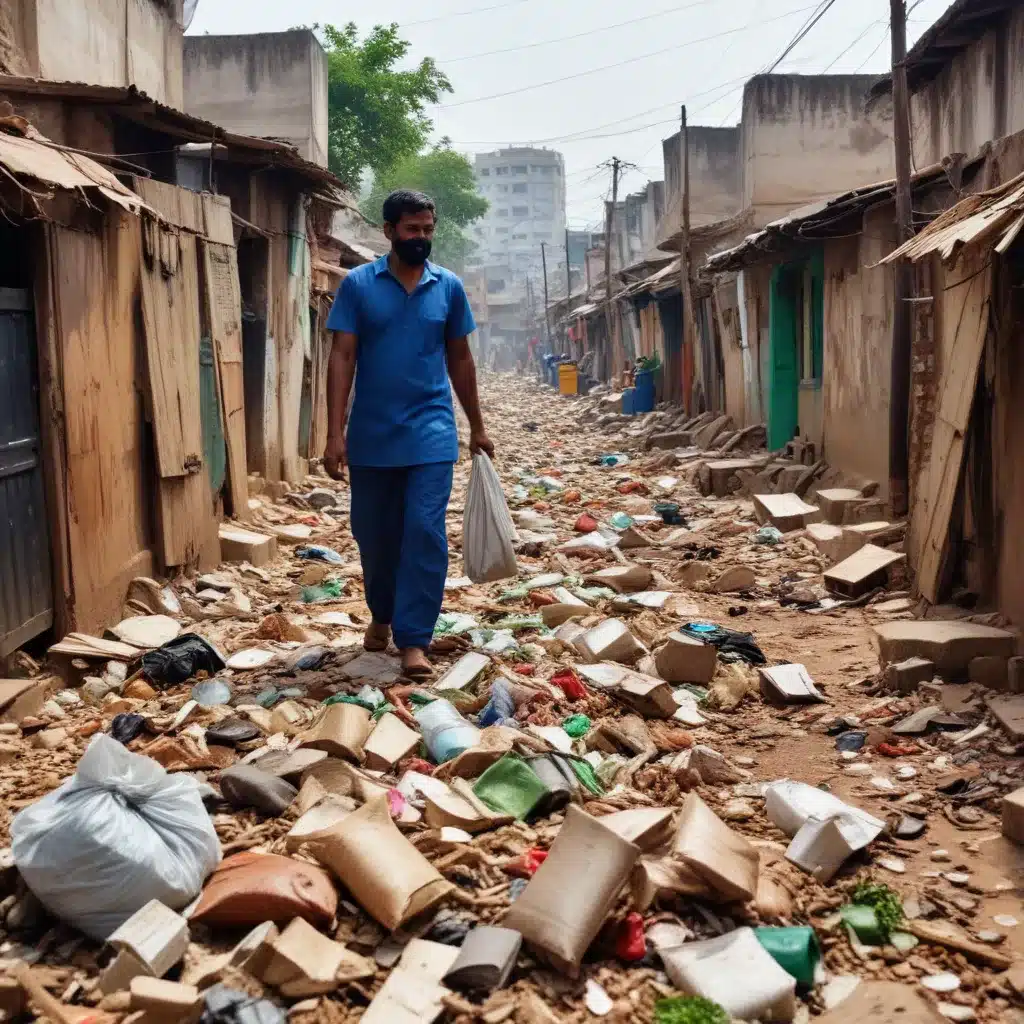
The Realities of Waste Management in Hyderabad’s Slums
Hyderabad, the bustling capital of Telangana, India, has experienced rapid urbanization in recent decades, attracting millions in search of economic opportunities. However, this growth has also led to a significant increase in waste generation, posing immense challenges, particularly in the city’s sprawling slum communities.
These marginalized settlements, home to over 1.5 million people, often lack access to basic services such as piped water, sanitation, and organized waste collection. Residents resort to dumping trash in open spaces, water bodies, and along the streets, contributing to environmental degradation and public health risks. Uncollected waste attracts vermin, blocks drainage systems, and pollutes the air and groundwater, exposing slum dwellers to a range of waterborne diseases and respiratory issues.
The situation is especially dire in Hyderabad’s largest slum, Gulbarga Colony, where residents describe the overwhelming stench and unsanitary conditions. “We have no choice but to throw our waste anywhere we can,” laments Rekha, a mother of three. “The municipal trucks come irregularly, and when they do, they ignore our neighborhood.” This lack of reliable waste collection services has forced many slum residents to adopt harmful practices, such as open burning of trash, which releases toxic fumes and contributes to the city’s notorious air pollution.
Transforming Waste Management through Community Engagement and Advocacy
Recognizing the urgent need to address this crisis, local organizations and community groups in Hyderabad have stepped up, spearheading innovative initiatives to improve waste management in the city’s slums. One such initiative is the work of the Slum Dwellers’ Federation (SDF), a grassroots network of community-based organizations advocating for the rights and wellbeing of the urban poor.
The SDF has adopted a multi-pronged approach, focusing on:
-
Raising Awareness and Building Community Capacity: Through door-to-door campaigns, educational workshops, and community events, the SDF is empowering slum residents to understand the importance of proper waste segregation, recycling, and disposal. By fostering a sense of ownership and environmental stewardship, the organization aims to shift mindsets and behavior within the community.
-
Strengthening Partnerships with Local Authorities: The SDF has established collaborative relationships with the Hyderabad Municipal Corporation (HMC), the city’s waste management authority. Together, they have worked to increase the frequency and coverage of waste collection services in slum areas, ensuring that all households have access to this vital service.
-
Promoting Decentralized Waste Management Solutions: In areas where municipal collection remains inconsistent, the SDF has facilitated the establishment of community-managed waste collection and recycling hubs. These hubs, operated by trained slum residents, provide door-to-door collection, segregation, and processing of recyclable materials, generating additional income for participating households.
-
Advocating for Inclusive and Sustainable Policies: The SDF has been a vocal advocate for policy reforms that address the unique challenges faced by slum communities. This includes pushing for the integration of informal waste pickers into the city’s formal waste management system, ensuring fair wages and safe working conditions, as well as advocating for the provision of basic services and infrastructure in slum neighborhoods.
The Impact of Community-Driven Initiatives
The SDF’s efforts have yielded tangible results, transforming waste management practices and improving overall cleanliness and environmental conditions in Hyderabad’s slums. In Gulbarga Colony, for example, the introduction of community-managed waste hubs has led to a significant reduction in indiscriminate dumping and burning of trash. Residents now actively participate in segregating their waste, with organic matter composted on-site and recyclables sold to authorized dealers, generating additional income for households.
Furthermore, the SDF’s collaboration with the HMC has resulted in more reliable and equitable waste collection services, covering previously neglected slum areas. This has not only improved public health and sanitation but also fostered a sense of civic pride and ownership among slum residents, who now view themselves as active stakeholders in the city’s quest for a cleaner and more sustainable future.
Scaling Up and Replicating the Hyderabad Model
The success of the SDF’s initiatives in Hyderabad has garnered national and international attention, serving as a model for other cities grappling with the challenge of waste management in informal settlements. Key to the model’s effectiveness is the emphasis on community engagement, capacity building, and the empowerment of slum residents as agents of change.
To scale up and replicate this approach, cities must:
-
Prioritize Inclusive Waste Management Strategies: Recognize the critical role of slum communities in the waste ecosystem and actively involve them in the design and implementation of waste management policies and programs.
-
Strengthen Partnerships between Authorities and Community Organizations: Foster collaborative relationships between municipal bodies and grassroots groups, leveraging their unique knowledge and capabilities to address service gaps and improve waste management outcomes.
-
Invest in Decentralized, Community-Led Waste Solutions: Support the establishment of decentralized waste collection, segregation, and recycling hubs operated by trained slum residents, enabling more effective and equitable service delivery.
-
Promote Innovative Financing Mechanisms: Explore innovative financing models, such as result-based financing and community-led microfinance, to incentivize and sustain community-driven waste management initiatives.
-
Advocate for Policy Reform and Inclusive Governance: Urge local and national policymakers to enact laws and regulations that recognize the rights and contributions of informal waste workers, ensuring their integration into the formal waste management system.
By replicating and scaling the Hyderabad model, cities across the global South can empower marginalized communities, improve public health and environmental conditions, and transition towards more inclusive and sustainable waste management practices. The journey towards a cleaner and greener future starts with empowering the very people who have been left behind.

